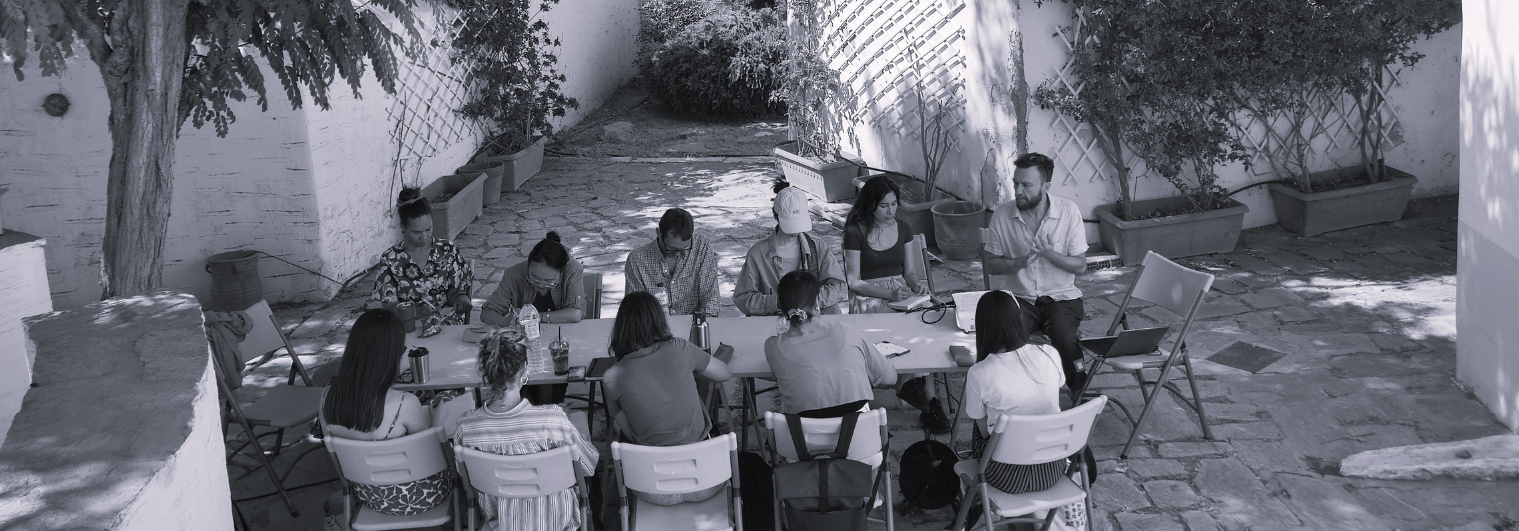
Summer Field School in Community Engagement for Cultural Heritage
This summer, HERITΛGE’s 11th Engaging Communities in Cultural Heritage Summer School brought together students, researchers and practitioners from around the world for two weeks of learning, discovery and collaboration. Through a range of activities, participants explored how communities engage with cultural heritage through a mix of academic sessions, practical fieldwork and creative activities.
The first week of the programme involved online teaching where participants were introduced to the ideas of engaging communities. Then, from June 23rd to July 6th, participants travelled to the Island of Paros where they were able to further explore what they had learned. Here is a look back at how it went.
Day 1: Mapping First Impressions
The in-person programme began in Paroikia, the island’s capital. After an introductory session, participants stepped out to create personal maps of the area using their senses as guides. In a group discussion, they shared first impressions and identified key questions to explore in the days ahead.
In the evening, the group travelled to Aliki to join the Klidonas midsummer festival. Music, dancing and lively conversation provided a first opportunity to connect with the local community and one another.
Day 2: Sensing the Island
Participants deepened their exploration by tuning into the sensory dimensions of Paroikia, focusing on its sounds, smells, textures and colours. Later, they collaborated on a collective mental map that reflected both individual and shared perspectives.
The day ended with a welcome dinner by the coast, accompanied by traditional music and conversation.
Day 3: Observation and Oral History Skills
Having become more familiar with the environment, participants focused on specific locations of interest, blending observation with active participation.
A hands on session introduced tools and techniques for conducting oral history interviews, with a focus on audio and video recording.
Day 4: Learning from the Locals
The group met with Spyros Mitrogiannis, a leading figure in local cultural work, who guided a visit to the Institute for Archaeology of Paros and the Cyclades. He shared insights into the cultural, environmental and political landscape of the island.
In the afternoon, participants examined themes such as ancient quarrying, fishing traditions and contemporary religious practices, laying the groundwork for their field research.
Day 5: Stories from Afar and At Home
Two guest speakers enriched the day’s programme. In the morning, Traci Kawai presented the Fisher Child project from Cape Town, a VR and AR exploration of sea, memory and healing.
In the evening, Katerina Konstantinou shared her research on folklore and local material culture, examining how heirlooms and souvenirs shape participatory documentation.
Between sessions, teams continued developing interview guides in preparation for community engagement.
Day 7: Walking the Paths of Heritage
In northern Paros, participants met Malatestas, President of Paros Park, who spoke about the challenges of heritage management and local involvement. A walk through the park’s trails highlighted the close ties between landscape and culture.
The day concluded with a beautiful sunset watched from the beach.
Day 8: Festivals and Tourism
The day focused on festivals as expressions of identity. Vicky Papadimitriou shared her experience with local, regional and national events, while Tim Healing offered case studies on community tourism and sustainability, prompting thoughtful discussion on responsible development.
Participants also used the day to refine their ongoing projects.
Day 9: Stories Set in Stone
The morning opened with discussions about interviews already carried out, ranging from fishing traditions to quarrying and religious offerings.
In the evening, Spyros Mitrogiannis led a visit to the Ancient Marble Quarries at Marathi, offering historical context and highlighting present day challenges around preservation.
Day 10: Visual Identity and Storytelling
Participants continued reviewing interview materials and shaping their group projects. In the afternoon, Irene Biza led a session on design and identity, exploring how visuals influence perceptions of place.
The day concluded with a screening of Yorgos of Kedros, a documentary that sparked reflection on storytelling and self representation.
Days 11 and 12: Final Preparations and Reflections
As the public presentations approached, teams worked to analyse ethnographic data and create podcasts, videos and visual materials.
Participants also attended a lecture by visual artist Natassa Biza, who offered new insights into ancient spolia around Paroikia, challenging conventional perceptions of historical remnants.
The final day was dedicated to collaboration, as teams prepared their presentations to the local communities and reflected on their shared journey.
Online Conference and Presentation
The field school concluded with the Online Engaging Communities Conference on Sunday, July 6th, where participants shared their insights and creative outputs with an international audience. This event was exclusively available to our trainees and alumni and included presentations and insights from the Summer Field School Alumni who shared their current research projects, sparking an engaging session enriched with thoughtful discussions and commentary.
Following the conclusion of the Conference, the trainees organized a presentation of their work that was open to the public and was widely attended. The presentation took place in the Dimitrokopoulos Building in Paroikia, with the kind support of the Municipality of Paros. During this second part of the evening, participants had the opportunity to share insights from our two weeks of fieldwork with attendees interested in their work.
“After days filled with collective challenges and individual discoveries, often marked by the initial confusion that is so characteristic of ethnographic research, this final presentation felt like both a validation of our efforts and an affirmation of our growing professional identities,” reflects trainee Claudia Valisano. “Beyond that, the event also had the potential to spark fresh interest among local residents in the island they call home, renewing awareness both for them and for us. Once all speeches were delivered and questions from the audience were addressed, guests were invited to enjoy food and drinks on the building’s beautiful terrace.”
You can find out more about our Summer School programmes and future dates here.

